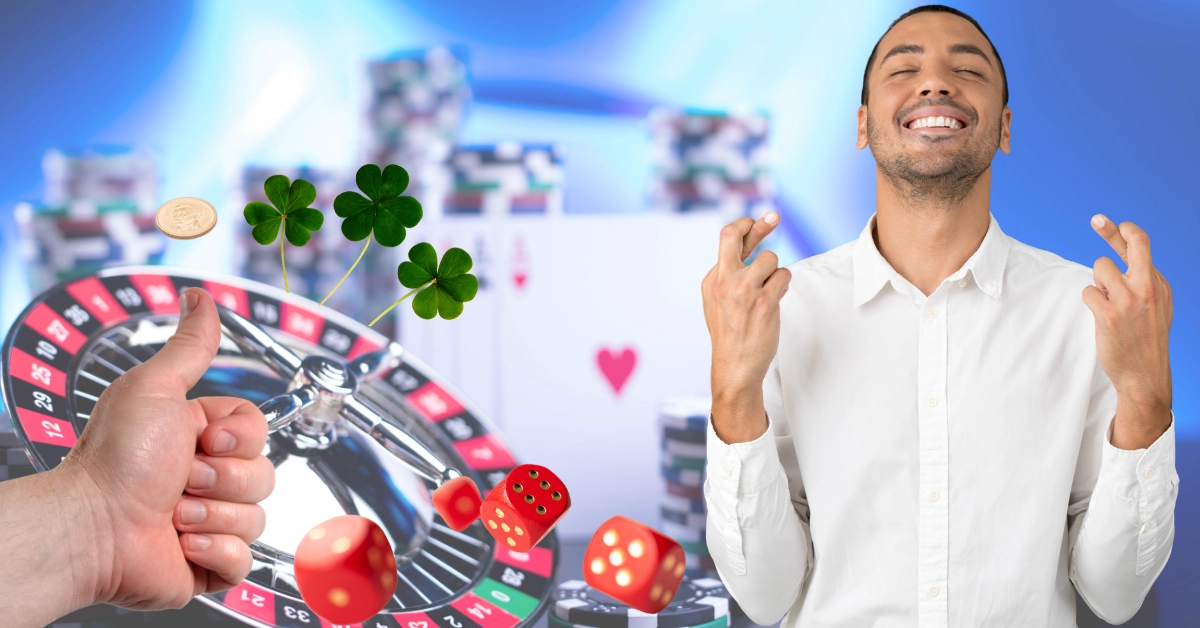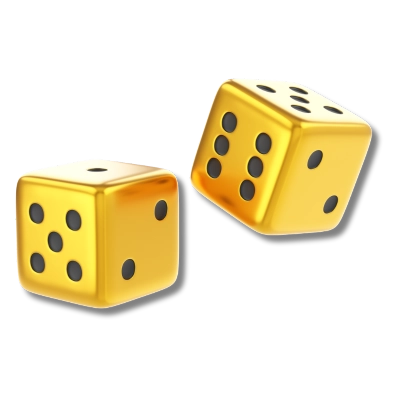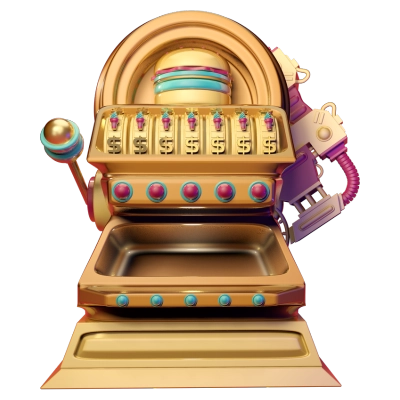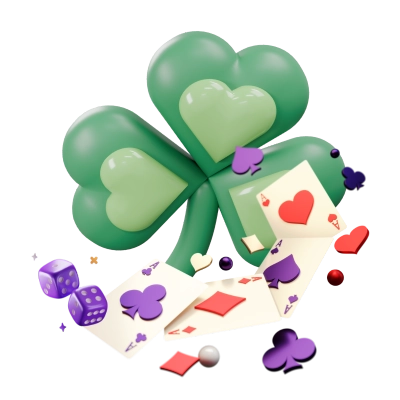How to Test Your Luck: Fun Experiments Before Betting Big

Luck in gambling is a concept that’s as fascinating as it is mysterious. Some days, it can feel like the universe is handing you all of the right cards, and other days…well, not so much. But before you decide to place any big bets, wouldn’t it be fun to figure out if fortune is actually favoring you?
You can test your luck! We’ll tell you what you can do to see if luck is on your side without risking a lot of money or time. You can think of it as a lighthearted (and low-stakes) way to build up your confidence before actually betting big!
The Psychology of Luck
Luck is such an intriguing concept, isn’t it? In gambling, it often feels like this invisible force—sometimes working for you, other times not so much. But what does “luck” really mean, and how does it influence how we play? Let’s get into all things luck!
Luck is one of those things that’s hard to define but easy to feel. For many gamblers, luck feels like the deciding factor between a win and a loss. It’s why some players swear by their lucky socks or insist on sitting in a certain spot at the poker table. These little rituals might not change the odds, but they make people feel more in control—like they’re tipping the scales of chance in their favor. Even though gambling outcomes are all about probabilities, the belief in luck makes the game more personal and, dare we say, fun.
What you believe about luck can totally change how you approach gambling. You might bet more aggressively if you think you’re on a hot streak. On the flip side, feeling unlucky could make you second-guess every decision. The funny thing is, luck doesn’t actually have rules—it’s not tied to past wins or losses. Every roll of the dice or spin of the wheel is independent. But our brains love to find patterns, even when none exist. That’s where the idea of lucky or unlucky streaks comes into play.
Here’s where it can get a little bit tricky. Luck feels real, but it’s not something you can measure with numbers. Sure, you can look at probabilities and statistics to figure out the odds of winning, but that’s not the same as determining whether you’re “lucky” today. The best approach is to enjoy the ride and keep your expectations grounded. Gambling is a game of chance, after all, and the thrill comes from not knowing what’s going to happen next.
Experiment #1: Coin Flip Test
A super easy way to get a sense of whether fortune is favoring you is by starting with something as simple as flipping a coin. It’s quick, easy, and—best of all—there is absolutely no money on the line; you get to keep the coin either way! Below, we break this experiment down and see what it could tell you about randomness and luck.
How It Works
Grab a coin, any coin, and flip it 10 to 20 times. Record whether it lands on heads or tails each time. If you’re feeling fancy, you can even make a small tally chart to keep track. At the end of your flipping spree, check to see if one side came up more often than the other. Did heads dominate? Was it a nail-biter between the two? Or, surprisingly, did the results end in a perfect tie?

The experiment taps into the randomness we all encounter in games of chance. Even though a fair coin has a 50/50 chance of landing on either side, short-term flips can sometimes produce surprising patterns. Heads might “win” five times in a row, making it feel like luck is on its side. And that’s where things get interesting.
What It Tells You
The coin flip test is less about predicting your actual gambling luck and more about demonstrating how randomness works. When you see a streak of heads or tails, it can feel like something bigger is at play—a lucky streak, perhaps. But in reality, it’s just the natural ebb and flow of probabilities.
If you find yourself leaning into the belief that luck is real, this experiment might help you understand why we tend to find patterns, even in randomness. And if the results are perfectly balanced? That can serve as a gentle reminder that luck isn’t always a magical force pulling strings behind the scenes—it’s often just a roll of the dice (or, in this case, a flip of the coin).
Pros and Cons
This little experiment has its perks, but it’s not without its flaws. Here’s a quick breakdown:
Pros:
- Super simple and doesn’t require anything beyond a coin.
- Quick to do—perfect if you only have a few spare minutes.
- A fun way to explore randomness and luck without any pressure.
Cons:
- Doesn’t actually predict gambling outcomes.
- Patterns that appear are purely random, not signs of real luck.
- Limited to short-term results and doesn’t reflect larger probabilities.
Experiment #2: Dice Roll Experiment
Ready to take testing your luck and kick it up a notch? Dice is another easy way to explore randomness without committing to real stakes. With just a pair of dice, you can roll your way through this simple experiment to see how chance plays out—no fancy equipment is needed.
How It Works
Grab a pair of dice and decide what you want to track. Are you looking for doubles, high rolls (like 8 and above), or low rolls (like 6 and below)? Roll the dice 15-20 times and jot down your results. If you’re aiming for doubles, count how many times you hit the same number on both dice. If you’re tracking high vs. low rolls, tally how many lands in each range.

The beauty of this experiment lies in how it mirrors the randomness you’d encounter in games like craps or other dice-based gambling. You’ll see patterns emerge that might feel like streaks or trends, even though the dice rolls are completely independent of one another.
What It Tells You
The dice roll experiment is a fun way to demonstrate probability and randomness in action. Just like the coin flip test, it shows how streaks can appear unexpectedly. For example, if you roll doubles three times in a row, it might feel like you’ve stumbled into a lucky streak. But in reality, those results are still just random occurrences.
What’s important here is recognizing how these patterns reflect the same randomness you’ll find in gambling games. They aren’t indicators of future success, but they do give you a peek into how probability can sometimes play tricks on our perception of luck.
Pros and Cons
This experiment has its strengths and weaknesses, making it more about fun and curiosity than predicting outcomes. Here’s a breakdown:
Pros:
- Easy to set up—all you need is a pair of dice.
- It adds a layer of complexity compared to the coin flip test.
- A fun way to explore how probability and randomness interact.
Cons:
- Doesn’t translate to actual gambling success or predict outcomes.
- Results are purely random and not influenced by skill or strategy.
- Short-term patterns may feel like they’re significant, but they’re really just chance at work.
Experiment #3: Personal Lucky Number Test
Everyone has that one number they feel connected to—a birthday, a jersey number, or just one that feels “good.” The personal lucky number test lets you put that fav number to the test in a fun and playful way. It’s all about seeing if your number pops up and how it makes you feel about your luck.
How It Works
Pick your lucky number—maybe it’s a 7, 13, or even something odd like 42. Once you’ve got it, test its “power” in games of chance where numbers play a role. For instance, you could place a small bet on your number in roulette, roll a dice aiming for it, or even use a random number generator to see how often it appears.

Keep track of how often your lucky number shows up. Does it feel like it’s appearing more than it should? Or does it seem like it’s hiding? Either way, this test is less about stats and more about having fun with the idea of personal luck.
What It Tells You
The experiment taps into the whole idea of personal connection and luck–when your number shows up, it can feel like the universe is giving you a wink, boosting your confidence as you prepare for bigger bets. Of course, there’s no science here—just random chance at work. But it’s a great reminder of how much mindset and belief can influence how we approach gambling.
If your number doesn’t show up much, that doesn’t mean you’re unlucky—it’s just the nature of probability. The real takeaway here is about enjoying the process and seeing how even the smallest wins can feel meaningful.
Pros and Cons
This test adds a personal touch to luck experiments, but it’s not without its downsides. Here’s a quick look at the pros and cons:
Pros:
- Personal and fun—it’s all about your own connection to a specific number.
- Great for low-stakes games like roulette or dice.
- It can improve your confidence if and when your number hits.
Cons:
- Purely based on chance, with no predictive value.
- Results can feel discouraging if your number doesn’t appear.
- Not tied to skill or strategy, so it’s just for fun.
Experiment #4: Slot Machine Practice
Slot machines are iconic in the world of gambling—bright lights, cheerful sounds, and the excitement of a possible win! But before you start betting for real, why not spend some time experimenting with low-stakes or free-play machines? It’s a relaxed way to get familiar with how slots work and understand the randomness that is working behind every spin.
How It Works
Start by finding a slot machine that doesn’t require much of a financial commitment—think penny slots or free-play versions you can find online. Many casino apps have demo modes that let you try out different games without spending a dime.

Once you’re all set up, spin those reels! Pay attention to how the paylines work, what bonus features pop up, and how symbols combine to form winning combinations. The goal isn’t to predict anything but to get a sense of the machine’s rhythm and the excitement it creates.
What It Tells You
Slot machines are all about randomness. Each spin operates independently thanks to something called a Random Number Generator (RNG). This means that no matter what happened on the last spin—win or lose—it doesn’t affect what happens next.
What this experiment does is help you understand that streaks or patterns you might notice are just part of how randomness feels. It can also give you a better understanding of slots’ different features, like jackpots or free spins, so you’re not caught off guard if you try real-money games later on.
Pros and Cons
This experiment has a lot going for it, but it’s not perfect. Here’s a quick breakdown:
Pros:
- No Pressure: Free-play machines let you explore without worrying about losing money.
- Learn the Basics: A hands-on way to understand paylines, symbols, and bonus rounds.
- Fun: Spinning the reels is pretty entertaining, even without money on the line.
Cons:
- No Real Wins: What you win in free-play stays in free-play.
- Misleading Confidence: Doing well on free games doesn’t mean you’ll hit the jackpot with real money.
- Time Sink: Slot machines are designed to keep you playing, so losing track of time is easy.
Pros:
Experiment #5: Luck-Based Games with Friends
If you’re looking for a low-pressure way to test your luck and have some fun while you’re at it, why not grab a few of your friends for a casual game where chance rules? It’s an easy and social way to see how you’re feeling about your lucky streak—or lack thereof—without risking any more than some friendly bragging rights.
How It Works
Pick a game that’s driven totally by luck. Think about card games like War, dice games like Liar’s Dice, or even something quirky like flipping coins. Set some lighthearted stakes—maybe the winner picks the next game or gets treated to snacks.

The idea is to focus on the randomness of the results and see how they play out over a few rounds. Keep track of your wins and losses, but don’t overthink it—it’s all about having fun and seeing if you’re riding a wave of good fortune.
What It Tells You
Playing luck-based games with friends is a great way to test the waters and see how you feel about your luck. If you’re consistently pulling off wins, it might give you a little boost of confidence heading into more serious games. On the flip side, if your luck seems to be running cold, it’s a good reminder that streaks can ebb and flow.
This type of experiment also shows you how chance works in social settings. Sometimes, you’ll find that just sharing a laugh over an unexpected outcome feels like a win in itself. It’s less about the results and more about getting comfortable with how randomness feels in the moment.
Pros and Cons
Like any experiment, there are upsides and a few limitations. Here’s the breakdown:
Pros:
- Social Fun: It’s a great excuse to hang out with friends and keep things fun and exciting.
- Low-Stakes Practice: No big money on the line, so it’s stress-free.
- Confidence Boost: Winning a few rounds can give you a little extra pep for later.
Cons:
- Chance Rules: Outcomes are entirely random and don’t predict real gambling success.
- Short-Term Variance: You might win or lose streaks without any real meaning behind them.
- Distractions: The social setting might make concentrating on the randomness at play a little bit harder.
Experiment #6: Testing Intuition with Simple Predictions
Have you ever felt in your bones that you just “know” what’s coming next? Testing your intuition with everyday predictions is a simple way to see if your instincts are tuned in. It’s not about being right all the time but about getting a sense of how connected you feel to the randomness of the day—and maybe giving yourself a little confidence boost before stepping into gambling.
How It Works
Pick something to predict as you go about your day. Maybe you guess what color car will come around the corner, the next song on shuffle, or which elevator door will open first. You’re not trying to be a fortune-teller here—just making small, harmless calls to see how often your gut lines up with the actual outcome.

You can mix it up or stick to a theme, like always guessing numbers or colors. Keep it casual, and don’t overthink it; this is just about observing how often you’re on the mark.
What It Tells You
This isn’t a scientific way to measure luck—it’s more about tuning in to your intuition. If your predictions are landing more often than not, it might give you that little mental boost to feel more confident in your decision-making. If not? It’s a reminder that chance doesn’t follow any rules, so there’s no harm in rolling with it.
The process itself can also sharpen your focus and get you thinking more about randomness. Even if the outcomes don’t always go your way, the act of making predictions can help you build a sense of awareness that’s helpful when you’re facing real stakes.
Pros and Cons
This approach has its benefits, but there are also a few things to keep in mind:
Pros:
- Confidence Builder: Helps sharpen your instincts and improve your mindset.
- Easy and Accessible: You can do it anywhere, anytime, without needing any tools.
- Low Pressure: There’s nothing to lose—just good observations and a little fun.
Cons:
- Not Predictive: Success in this doesn’t mean you’ll win at gambling.
- Overthinking Risks: If you overanalyze, it can take away from the simplicity of the experiment.
- Short-Term Focus: It’s more about the moment, not about long-term trends or patterns.
Tips for Testing Luck Wisely
Testing luck is a really fun way to experiment with how randomness plays out, but it’s super important to approach the above experiments with the right mindset. They’re not crystal balls for predicting betting outcomes—they’re just easy ways to improve your confidence and to understand chance better! Below are some simple tips to keep your experiments fun and productive.
Set Realistic Expectations
Luck in these tests isn’t a sign of how you’ll perform in actual gambling. Random events don’t have memory, and what happens during your coin flips or dice rolls won’t carry over to a poker hand or a roulette wheel spin.
Treat these experiments as practice runs, not predictors. They’re helpful for warming up, getting comfortable with the concept of randomness, and maybe building a little confidence. Just avoid leaning on the results too heavily when it’s time to bet since gambling is always unpredictable.
Know When to Stop
It’s really easy to get carried away with testing your luck, especially if you’re hoping for a streak to turn around magically. But overdoing these experiments or taking them too seriously can take the fun out of them.
Call it a day if you’ve done a few rounds and feel mentally ready. And if your results haven’t been great, don’t let it bring you down. These tests aren’t about proving luck; they’re about relaxing into the randomness. If you’re betting for fun later, a streak of “bad luck” here doesn’t mean much—it’s all just part of the process.
Have Fun!
Testing your luck is meant to be a casual activity, not a high-pressure exercise. Laugh at the patterns you notice (or don’t), talk about what you found out with your friends, or just treat the experiments as a way to play around with chance and luck.
Conclusion: Lucky Litmus Tests
Trying your luck with any (or all) of these simple experiments is a really great way to test out the randomness and give yourself a little more confidence before you place any big real-money bets!
Here’s what you should remember:
- The experiments are meant to be all in good fun; they are not tools for predicting wins or losses.
- They can help you feel more confident about betting or you can just have fun with the process of observing how luck works (or doesn’t).
- Each of the tests is a low-stakes way to play around with the idea of luck.
The ultimate goal is to have fun and to not overthink any of the results. Keep things casual, don’t forget that all betting involves some amount of risk, and treat the experiments as what they are: fun.
Have you ever tried out one of the experiments? If you’re flipping coins, rolling dice, or testing your intuition, we want to hear how it went. Tell us your stories—or any lucky traditions that you swear by—in the comments below!

Alyssa contributes sportsbook/online casino reviews, but she also stays on top of any industry news, precisely that of the sports betting market. She’s been an avid sports bettor for many years and has experienced success in growing her bankroll by striking when the iron was hot. In particular, she loves betting on football and basketball at the professional and college levels.








